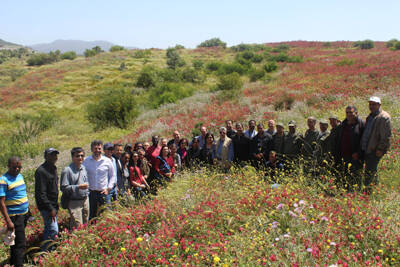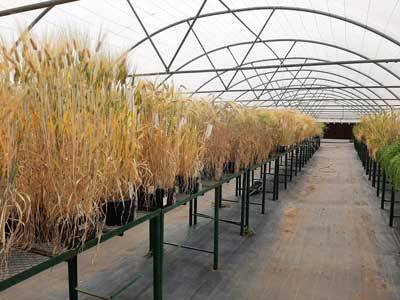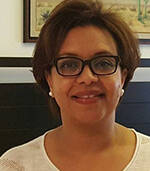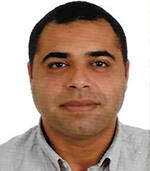Collecting, conserving, and deploying agrobiodiversity to support dryland communities
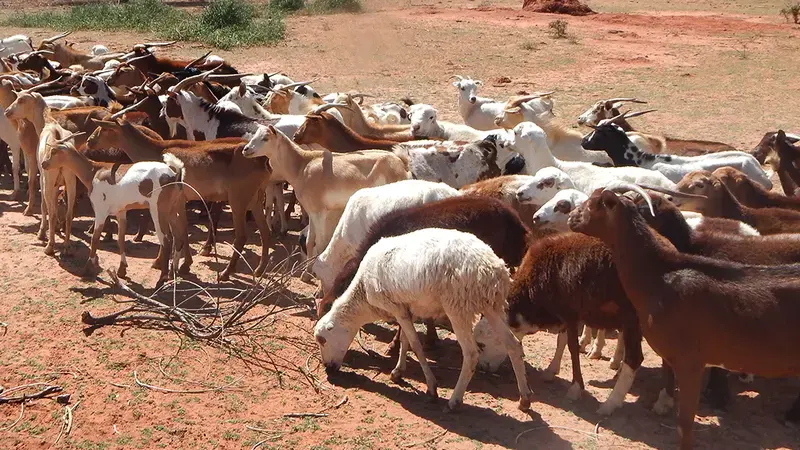
By Zakaria Kehel and Bezaiet Dessalegn
Our Solutions are in Nature
Agrobiodiversity is the genetic variety and variability of animals, plants, and micro-organisms that are used for food and agriculture, including crops, livestock, forestry, and fisheries. It encompasses the diversity of genetic resources that ICARDA depends on to create new resilient varieties and design and implement breeding schemes that produce more resilient and productive animals (sheep, goats, and camels), as well as cereals, food legumes and forage It also includes the diversity of companion species that improve crop yields and production such as soil micro-organisms, predators and pollinators.
Yet the global pool of biological diversity is diminishing every day because of the effects of human activity. There is no doubt that, unless the current trend is reversed, there will be serious challenges for future food security as we become limited by a lack of genetic variation that allows us to improve crop varieties and livestock populations in the face of global challenges.
A wider gene pool means better livestock
Biological diversity is essential to our community-based livestock breeding programs. Using indigenous genetic resources, ICARDA scientists have developed ways to increase sheep and goat productivity and climate resilience through strategic selection methods. Our farmer–scientist interactions help evaluate different breeding options based on close monitoring of individual animals, leading to continuous genetic improvement and expansion of the biological base to build. Along with projects that improve farmer’s access to inputs and markets, this makes sure that animals’ resilience is improved, and farmers' incomes grow even as environments change.
Biological diversity – the key to breeding and adapting improved plant varieties
At ICARDA, the collection and use of landraces and wild relative plant species have substantially contributed to the biologically diverse pool from which our International Nurseries can develop, multiply and release promising germplasm and plant varieties that contribute to food and nutritional security and become available to global publics. New varieties resilient to heat, drought, pest and disease are tested by our crop improvement programs and the National Agricultural Research Systems that partner with us in countries where we work. This happens under country-specific agro-ecological conditions and socio-economic contexts, so that the potential for uptake and successful yields in that country is maximized.
ICARDA scientists also promote solutions for sustainable management and use of natural resources that foster biodiversity such as conservation agriculture, diversification through cereal-legume rotations to naturally restore soil health, crop-livestock integrated systems to increase soil organic matter and water infiltration, and planting of strategic shrubs to restore degraded agro-pastoral land.
Protecting and conserving biodiversity
ICARDA’s gene bank system was established in Syria in 1985 and has since relocated to Lebanon and Morocco. It currently contains 157,000 samples of wheat, barley, lentil, faba bean, chickpea, grass pea, and several temperate forage species - many of which are now extinct or endangered. ICARDA also keeps safe a collection of unique genetic materials, rich in landraces and wild relative species, many of which are disappearing. Together, this contributes to a diverse biological gene pool without which the ability of ICARDA and its partners to have produced successful varieties in recent years may have been lost forever. More than 85 percent of new varieties that ICARDA has collected and deposited in the Genebank are studied for their climate and disease-resistant characteristics. All varieties are safely duplicated in reliable gene banks around the world, while around 75 percent are duplicated and sent to the Svalbard Global Seed Vault (the global ‘Doomsday’ vault).
Improving crops from a rich agrobiodiversity base
Our biodiversity and crop improvement research program efforts introduce desirable traits from landraces and wild relatives into elite germplasm, mainstreaming nutritional quality (including biofortification) into current breeding programs, and widening the genetic base as a major strategy to increase yield potential, stability, quality, and nutrition.
As successful new varieties resilient to challenges such as water scarcity and drought, disease, and heat, are discovered or bred, they are taken up by our International Nurseries system, an integral part of the crop improvement programs of ICARDA and its National Agricultural Research Systems partners stationed in the countries where we work. The National Nurseries provide governments, breeding programs, and dryland communities the means to evaluate genetically diverse germplasms generated through ICARDA’s conventional and modern breeding approaches. Crucially, this allows them the opportunity to test new varieties under their own agro-ecological conditions and socio-economic contexts, making sure that research is closely linked to use, and the potential for successful cropping is maximized.
Biodiversity loss is a loss for humanity
- “As we encroach on nature and deplete vital habitats, increasing numbers of species are at risk. That includes humanity and the future we want.” - UN Secretary-General António Guterres
As the impact of climate change intensifies, populations grow, and global health crises like COVID-19 emerge, the need to collect, conserve, and utilize biological diversity around the world grows more urgent. ICARDA’s genebanks, international nurseries, and crop/livestock breeding programs, hold irreplaceable genetic resources and open-access data that are available upon request to any user anywhere, to help create and duplicate new and resilient varieties that can meet current and future challenges faced by global communities.
Only by protecting and developing biological diversity can we make sure that current and future generations can access the key building blocks that contribute to their food security.
-----------------------------------------------
Bezaiet Dessalegn is ICARDA Social Sciences Specialist
Zakaria Kehel is ICARDA Head of Genetic Resources, Pre-breeding and Gene Bank Operations

